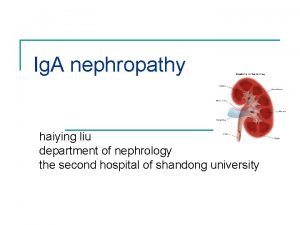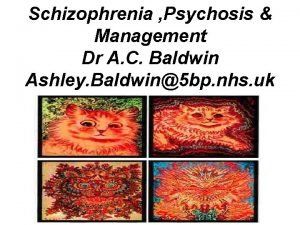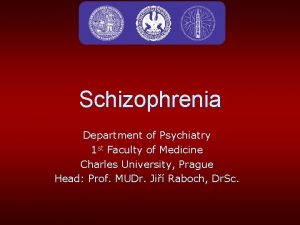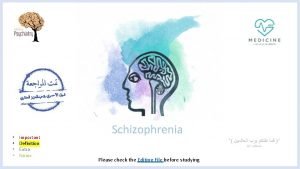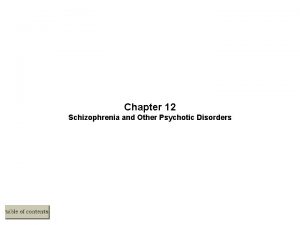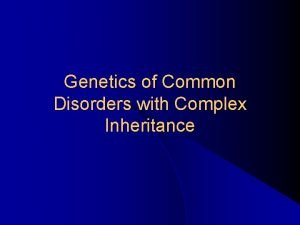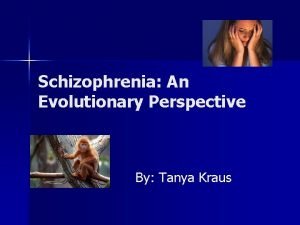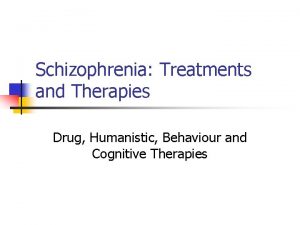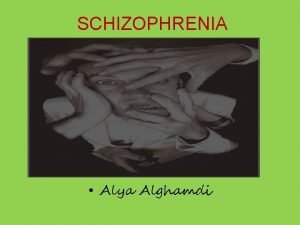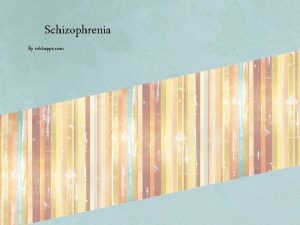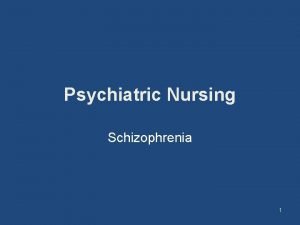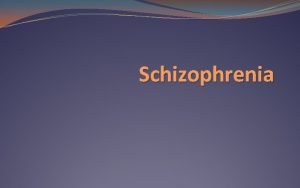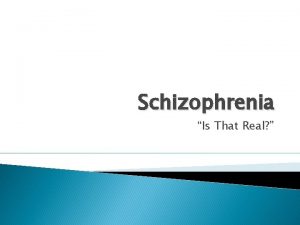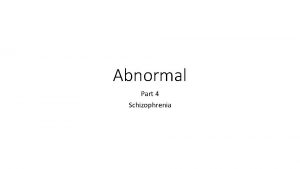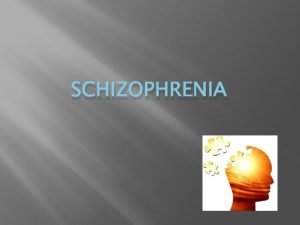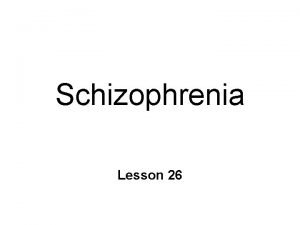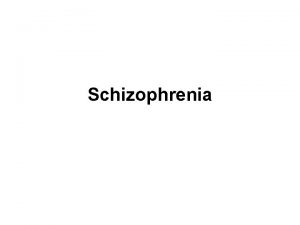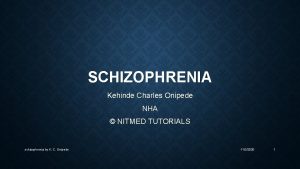Schizophrenia Minseo Kim Diana Sattarova Haiying Weng Helen





















- Slides: 21

Schizophrenia Minseo Kim, Diana Sattarova, Haiying Weng, Helen Zhuo A. P. Psychology

AIM What patterns characterize and cause schizophrenia?

Definition of Schizophrenia is a psychological disorder characterized by delusions, hallucinations, disorganized speech, and/or diminished or inappropriate emotional expression. ○ Schizophrenia literally means “split mind. ” It does not refer to personality split but to split from reality. Schizophrenia is an example of psychosis (psychotic disorder), a psychological disorder in which a person loses contact with reality, experiencing irrational ideas and distorted perceptions.

Symptoms of Schizophrenia A person with schizophrenia could have beliefs, often persecution or grandeur. delusions, which are false ● People with paranoid tendencies are more prone to have delusions of persecution. A schizophrenic person might talk in sentences formed with jumbled ideas. word salad , which are Another symptom of schizophrenia could be hallucinations, false sensory experience, such as seeing something in absence of external visual stimulus. ● Most often, hallucinations are auditory (frequently making insulting remarks or giving orders).

Symptoms of Schizophrenia Those with schizophrenia have disorganized thoughts that may result of their difficulty using selective attention. ● Selective attention is the capacity to focus our attention on one set of sensory stimuli and filtering out the others. ● A schizophrenic people can be easily distracted by irrelevant stimuli.

Symptoms of Schizophrenia People with schizophrenia often have inappropriate emotions or affect (emotionless). Most also have difficulty perceiving facial emotions and reading others’ state of mind. They may have inappropriate motor behaviors or (motionless). catatonia flat

Types of Schizophrenia ○ Paranoid-type schizophrenia is marked by delusions of persecution or conspiracy and is often accompanied by auditory hallucinations. ○ Disorganized-type schizophrenia is marked by disorganized thought processes, disorganized speech and behavior, and flat affect. ○ Catatonic-type schizophrenia is marked by extremes in movement and behavior from hyperactive agitation to complete immobility. ○ Undifferentiated-type schizophrenia is when symptoms do not clearly fall into the above subtypes. ○ Residual-type schizophrenia is to describe patients who have had a history of schizophrenia but whose symptoms have diminished.

Onset and Development of Schizophrenia patients with positive symptoms (presence of inappropriate behaviors) may: ○ Experience hallucinations. ○ Talk in disorganized and deluded ways. ○ Exhibit inappropriate laughter, tears, or rage. They may also experience negative symptoms (absence of appropriate behaviors), such as: ○ “Flat Affect” (toneless voice and expressionless face). ○ Mute/Rigid bodies. ○ Difficulty beginning and sustaining activities. Some also express cognitive symptoms: ○ Difficulty understanding and processing information. ○ Issues with working memory.

Onset and Development of Schizophrenia typically strikes as young people are maturing into adulthood. It can develop gradually or appear suddenly. When schizophrenia is a slow-developing process (called chronic, or process , schizophrenia), recovery is doubtful. ○ Often exhibit the persistent and incapacitating negative symptom of social withdrawal When previously well-adjusted people develop schizophrenia rapidly (called acute, or reactive , schizophrenia) following particular life stresses, recovery is much more likely. ○ Often have the positive symptoms that are responsive to drug therapy

Understanding Schizophrenia Many studies have looked at the relationship between schizophrenia and brain abnormalities. Schizophrenia patients’ brains have an excess of receptors for dopamine. PET Scans have found dopamine differences in the: ○ Prefrontal Cortex ○ Cingulate Cortex ○ Hippocampus Speculations that the hyper-responsive dopamine system may intensify brain signals in schizophrenia, creating positive symptoms such as hallucinations and paranoia. “Schizophrenia is a disease of the brain manifest in symptoms of the mind. ”

Understanding Schizophrenia Abnormal Brain Activity and Anatomy Modern brain scanning techniques reveal that many people with chronic schizophrenia have abnormal activity in multiple brain areas. ○ Some have low activity in frontal lobes, which are critical for problem solving, planning, and reasoning. Patients display a noticeable decline in the brain waves that indicate synchronized neural firing in the frontal lobes. ○ Out of sync neurons = disruption of the functioning of neural networks that can cause some of the symptoms of schizophrenia.

Understanding Schizophrenia When patients were hallucinating, PET scans showed their brains as extremely active in core regions like thalamus (filters incoming signals) and amygdala (fear processing center) Other studies have found fluid-filled areas, as well as shrunken and thin cerebral tissue in patients. ○ Some studies found these abnormalities in people who would develop the disorder. ○ The greater the shrinkage, the more severe the disorder. later

Understanding Schizophrenia Areas that are affected by the shrinkage are: ○ Cortex ○ Corpus callosum (connection between the hemispheres) ○ Thalamus Schizophrenia involves not only one isolated abnormality, but problems with several brain regions and their interconnections ○ Its risk factors include low birth weight, maternal diabetes, older paternal age, oxygen deprivation during delivery, and famine

Understanding Schizophrenia Maternal Virus During Mid-Pregnancy A mid-pregnancy virus that impairs the fetal brain can also be a cause of schizophrenia. Scientists have tried to test this fetal-virus idea and found that○ People are at risk of schizophrenia if their country experienced a flu epidemic during their fetal development ○ People born in more populated areas where disease spreads faster have a higher risk of schizophrenia ○ People born during the winter and spring (after flu season) are also at a slightly increased risk

Understanding Schizophrenia ○ People in the Southern Hemisphere have reversed months of above-average schizophrenia births than in the Northern Hemisphere ○ Mothers who develop influenza during their second trimester of pregnancy are more likely to have children who develop schizophrenia. □ Maternal influenza also affects brain development (in monkeys) ○ Women whose children developed schizophrenia had higher-than - normal levels of antibodies in their blood during pregnancy □ Suggests a viral infection

Understanding Schizophrenia There is a lot of evidence proving that fetal-virus infections can contribute to a child later developing schizophrenia. Mothers that are three months into their pregnancy during flu season are strongly recommended to get a flu-shot.

Genetic Factors Evidence strongly suggests that some people inherit a predisposition to schizophrenia ● 1 -in-100 odds of person being diagnosed with schizophrenia 1 in 10 among those whose sibling or parent has the disorder 1 in 2 if the affected sibling is an identical twin Epigenetic factors (nutritional deprivation, maternal stress) can “turn on” genes that predispose schizophrenia

Psychological Factors No environmental causes produce schizophrenia, but there are environmental triggers. Possible early warning signs: ○ A mother whose schizophrenia was severe and lost-lasting ○ Birth complications (oxygen deprivation, low birth weight) ○ Separation from parents ○ Short attention span and poor muscle coordination ○ Disruptive behavior ○ Emotional unpredictability ○ Poor peer relations

Treating Schizophrenia The causes for schizophrenia are still unknown, but patients with the condition have been treated with: ○ Antipsychotics □ Typical & Atypical ○ Psychosocial Therapy □ Cognitive Rehabilitation □ Social Skills Training □ Psychoeducation ○ Coordinated Specialty Care (CSC)

http: //www. golf-mental-game-coach. com/support-files/concentrationexercise. pdf

Schizophrenia Simulation Anderson Cooper Tries a Schizophrenia Simulator: https: //www. youtube. com/watch? v=y. L 9 UJVtg. PZY Schizophrenia Audio Simulation: https: //www. youtube. com/watch? v=0 vv. U-Ajwbok
 Weng-keen wong
Weng-keen wong Lilianweng github
Lilianweng github Haiying deng
Haiying deng Haiying shen
Haiying shen Ppi
Ppi Zhiping weng
Zhiping weng Weng-keen wong
Weng-keen wong Familias uniformadas
Familias uniformadas Helen midtown computer solutions helen speaking
Helen midtown computer solutions helen speaking Teaj
Teaj Catatonic schizophrenia
Catatonic schizophrenia Ashley baldwin
Ashley baldwin Hebephrenic schizophrenia
Hebephrenic schizophrenia Res extra commercium
Res extra commercium Schizophrenia def
Schizophrenia def First-line treatment for schizophrenia
First-line treatment for schizophrenia Is schizophrenia genetic
Is schizophrenia genetic Tanya kraus
Tanya kraus Humanistic approach to schizophrenia
Humanistic approach to schizophrenia Prevalence of schizophrenia
Prevalence of schizophrenia Schizophrenia dsm 5
Schizophrenia dsm 5 Hebephrenic schizophrenia
Hebephrenic schizophrenia




